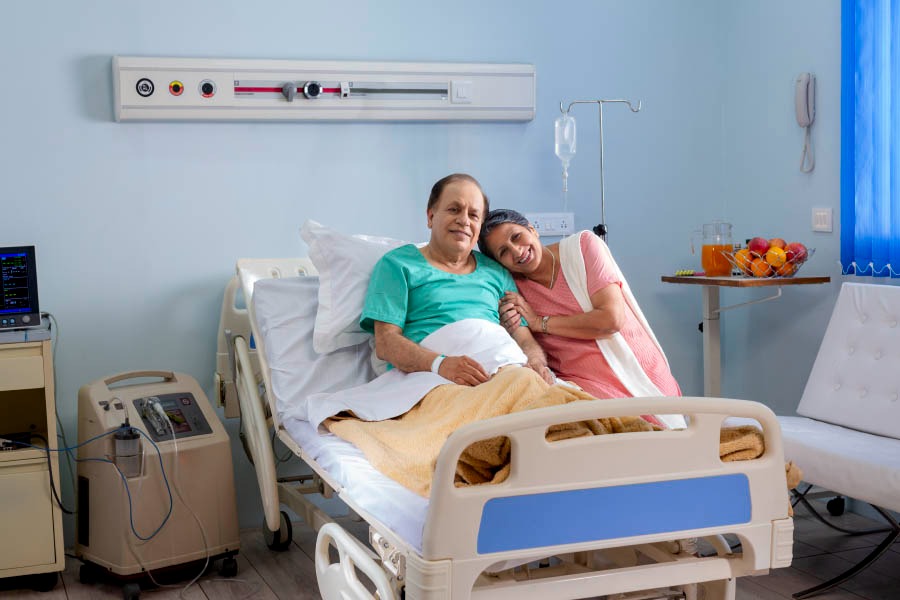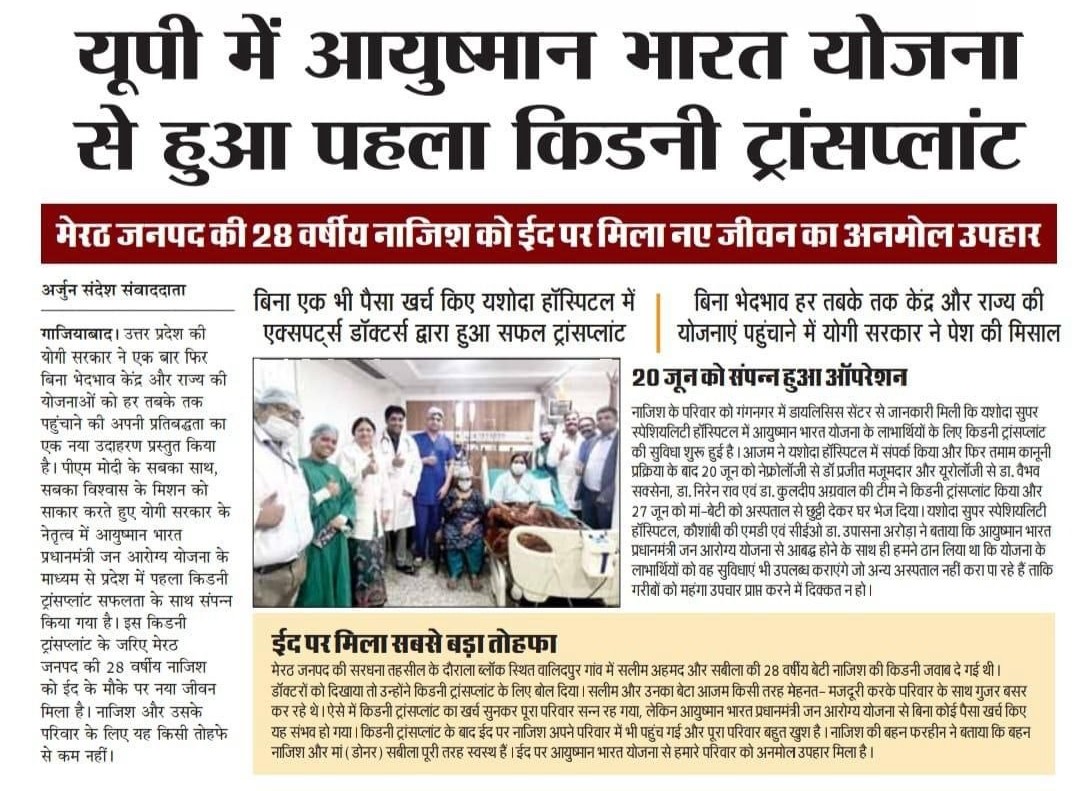

Overview of Specialty
The Department of Interventional Radiology at Yashoda Medicity and Yashoda Super Speciality Hospital, Kaushambi, specialises in minimally invasive procedures performed under advanced image guidance, including Digital Subtraction Angiography (DSA), Fluoroscopy, Ultrasound, CT, and MRI.
These procedures often replace conventional surgery, offering smaller incisions, less pain, faster recovery, and fewer complications. Most interventions are performed under local anaesthesia with mild sedation, keeping individuals comfortable throughout.
Advantages of Interventional Radiology
Smaller incisions, often only a needle puncture
Minimal pain and scarring
Shorter hospital stay
Faster recovery and return to normal activities
Lower risk of complications and infection
Services Available
Neurointervention / Interventional Neuroradiology
Gastrointestinal and Hepatobiliary Interventions
Interventional Oncology
Thoracic, Renal, and Pelvic Interventions
Aortic and Peripheral Vascular Interventions
Pain Management and Orthopaedic Interventions
Ultrasound / CT-guided Biopsies and Drainage Procedures
Dialysis Access & Vascular Line Placement
Expanded Service Spectrum
Neurointerventional Services
Diagnostic cerebral and carotid angiography
Stroke management (mechanical thrombectomy, stenting)
Aneurysm coiling and stent-assisted procedures
Embolisation of AVMs, fistulas, and vascular malformations
Preoperative embolisation of tumours
Carotid and intracranial stenting
Intra-arterial chemotherapy for retinoblastoma
Interventional Oncology
Chemoembolisation (TACE) and radioembolisation (TARE)
Ablation therapies for liver, pancreas, renal, lung, and bone tumours
Tumour biopsies and drainage of collections
Biliary drainage, stenting, and radiofrequency ablation
Palliative pain management
Hepatobiliary and Gastrointestinal Interventions
Angiography and embolisation for GI bleeding
Splenic and mesenteric interventions
Bariatric gastric artery embolisation
TIPSS and DIPS procedures
Portal vein embolisation
Biliary drainage and stenting
Renal and Genitourinary Interventions
Renal angioplasty and stenting
Embolisation for renal bleed and tumours
Dialysis access creation and maintenance
Percutaneous nephrostomy and stenting
Pelvic Interventions
Uterine artery embolisation for fibroids and postpartum haemorrhage
Varicocele and prostatic artery embolisation
Pelvic congestion and priapism interventions
Aortic and Peripheral Vascular Interventions
Aortic aneurysm and dissection management
Peripheral angioplasty and stenting
Varicose vein ablation
Catheter-directed thrombolysis and thrombectomy
IVC filter placement and retrieval
Thoracic Interventions
Bronchial artery embolisation
Pulmonary AVM embolisation
Pulmonary thrombectomy
Lines and Vascular Access
Tunnelled dialysis catheters
Hickman line, PICC line, and chemoport placement
Ultrasound / CT-guided Non-Vascular Procedures
Biopsies of liver, lung, pancreas, and renal lesions
Aspiration and drainage of collections
Thermal ablation of liver, renal, and lung masses
Pain Management
Nerve blocks and joint injections
Celiac plexus block, lumbar sympathectomy
Genicular artery embolisation for osteoarthritis
Orthopaedic Interventions
Bone biopsies
Vertebroplasty
Ablation of osteoid osteoma
Genicular artery embolisation
Technologies and Diagnostic Tools
Philips Azurion 7 B20/15 (Biplane) & Azurion 7 M12 (Monoplane): Advanced cathlab systems for complex vascular and non-vascular procedures
Voluson E10 & Fortis GE Ultrasound Machines: High-precision ultrasound guidance
Revolution Frontier 256 Slice Spectral CT & Revolution Aspire Plus CT: Superior CT imaging for interventional procedures
MRI & Fluoroscopy Guidance: For targeted minimally invasive interventions

Consultant – Interventional Radiology & NeuroRadiology

Senior Consultant – Radiodiagnosis & Interventional Radiology

Attending Consultant – Radiology & Imaging

Senior Consultant – Radiology & Imaging

A tremendous job has been done by Dr. Amit Sharma. I met with an accident in which the ACL ligament of my left knee was completely torn. I met Dr. Amit Sharma then he analysed the situation and told us about the procedure and the time period to recover from the injury. He has performed a successful surgery. The good thing is the confidence that Dr. Amit Sharma has on his surgery that he didn’t put braces on the knee while other doctors put the braces on for a month and then started Physiotherapy which will take a longer time period to heal from the injury. Dr. Amit Sharma has started the Physiotherapy from the very next day of the...
A tremendous job has been done by Dr. Amit Sharma. I met with an accident in which the ACL ligament of my left knee was completely torn. I met Dr. Amit Sharma then he analysed the situation and told us about the procedure and the time period to recover from the injury. He has performed a successful surgery. The good thing is the confidence that Dr. Amit Sharma has on his surgery that he didn’t put braces on the knee while other doctors put the braces on for a month and then started Physiotherapy which will take a longer time period to heal from the injury.
Dr. Amit Sharma has started the Physiotherapy from the very next day of the surgery and i was discharged in 2 days, and the Physiotherapy is undergoing at my home. It's the 10th day today and I have gained so much confidence in 10 days that I am recovering very fast and in a few weeks I will be able to walk without any support.
Thanks to Dr. Amit Sharma, he is really having magical hands, he is very kind in nature, in my regular visits all of my stress went away after talking to him.
Again Thank You so much Doctor
Treatment By:
Dr. Amit Sharma
Date:
09 Apr 2025

A young female was diagnosed with chronic kidney disease after developing generalised weakness, loss of appetite, and intermittent vomiting. Investigations revealed impaired renal function with urea of 200 mg/dl, creatinine of 8 mg/dl, and haemoglobin of 9 g/dl. She was started on haemodialysis through a catheter placed in the right side of her neck and was advised AV fistula creation along with maintenance haemodialysis three times a week. She consulted our expert team of doctors, Dr Prajit Mazumdar, Dr Vaibhav Saxena, and Dr Kuldeep Agarwal, at Yashoda Superspeciality Hospital, Kaushambi. They recommended renal transplantation as ...
A young female was diagnosed with chronic kidney disease after developing generalised weakness, loss of appetite, and intermittent vomiting. Investigations revealed impaired renal function with urea of 200 mg/dl, creatinine of 8 mg/dl, and haemoglobin of 9 g/dl. She was started on haemodialysis through a catheter placed in the right side of her neck and was advised AV fistula creation along with maintenance haemodialysis three times a week.
She consulted our expert team of doctors, Dr Prajit Mazumdar, Dr Vaibhav Saxena, and Dr Kuldeep Agarwal, at Yashoda Superspeciality Hospital, Kaushambi. They recommended renal transplantation as the best form of renal replacement therapy. Her transplant workup was initiated, and her mother, who had a matching blood group, was identified as the donor.
After obtaining clearance from cardiology, pulmonology, gynaecology, and psychiatry, as well as approval from the authorisation committee, she successfully underwent renal transplantation with ATG induction. Post-transplant, she maintained good urine output with steadily decreasing creatinine levels and was discharged with a creatinine of 1.2 mg/dl.
She continues to do well on outpatient follow-up, two years after her transplant, with stable graft function.
Treatment By:
Dr Prajit Mazumdar, Dr Vaibhav Saxena, and Dr Kuldeep Agarwal
Date:
29 Jun 2023
Finally successful operation of father disease Lipoma has been done. Thanks a lot to Dr. Asheesh, Dr. Govind and Dr. Arindam Mukherjee, Nurses along with all staff. Nice experience, overall I can say every service of this hospital is outstanding.
Our heartfelt thanks to the entire Hospital, especially Dr Aayush Goyal and his team who performed the CABG surgery on our patient (Sh Arvind Bhatia) with extremely satisfactory results. Personal attention given to our case by the hospital COO, Dr. Sunil Dagar and the total management and the hospital staff, who ensured we were given utmost priority in all respects during the course of the treatment. Special thanks to Dr Asit Khanna for his diagnosis and guidance. Last but not the least, the homecare services provided by the hospital were really good.
Excellent services
Outstanding Results
We wish all the best to the hospital and its team.
